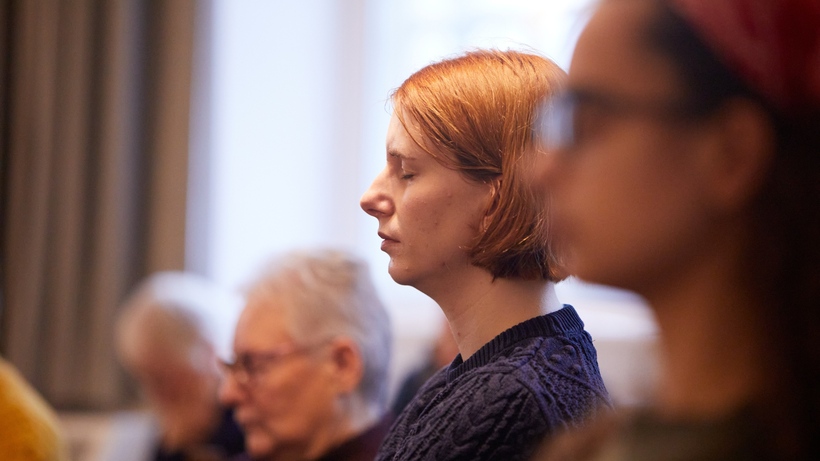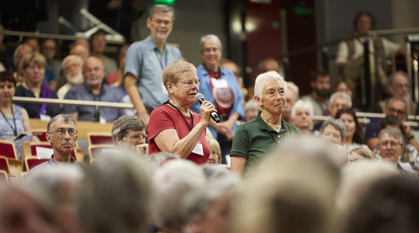Foundations and future: meeting for worship and the confident voice of early Friends
Jo Baynham reflects on early Quaker insights around Quaker ways of worship and how this forms the foundation of Quaker worship today.

Quakers often talk about values being the attractive part of Quakerism. This is especially true when talking to young people and children. There is a sense in which our values, or testimonies, are where the action is, the place where Quakerism is at its most relevant and attractive.
Sometimes Friends will talk about our community being the attractive part of our faith. Indeed, American Friends see community as one of the Quaker testimonies. I would not go that far. As a relatively new attender I can say that I love the small Quaker community of which I am a part. They support and guide me; they provide a deep welcome for me and my daughters. As a community we begin to know each other in the things that are eternal, but it is not these things that keep me coming back week after week.
What keeps me coming back is that we, as a community, go seeking in the stillness together, and, every once in a while, we catch a fuzzy glimpse of the edge of That Unfathomable Thing that lies at the bottom of everything, and we allow that glimpsing to change us.
It is from this glimpsing that our values and testimonies arise.
To say that Quaker testimonies are the attractive part of Quakerism whilst saying nothing of meeting for worship is like asking a chef to give you the flavour without the food!
[QUOTE-START]
So dwell in the Light, and wait upon God to have the image of God renewed, and all come to witness yourself restored by Christ Jesus to the image of God, and to be made by him like to God, pure, holy, perfect, and righteous. This was witnessed; this is witnessed, and this will be witnessed measurably with thousands, who are growing up out of the Fall.
- George Fox, 1653, Epistle 32.
[QUOTE-END]
Fox intentionally evokes the Gospel of Luke here. Like the Gospel writer, Fox uses the rhythmic repetitious language of witnessing, seeing and looking to suggest that meeting for worship allows us to see something that changes absolutely everything. Yorkshire Link Grouper, Fynn (14), describes it thus:
[QUOTE-START]
99% of the time I don't feel anything, I'm just there. But I go because of that 1% of the time changes the way I see the world. I go because of the spiritual connection; I don't know what with yet but I know it's there.
[QUOTE-END]
Early Friends knew the mystery of meeting for worship deeply and used biblical language to describe it. Whatever language you use, the Indescribable Transforming Truth that lies behind the message remains unchanged.
Like Fox, modern Quakers live in the paradox of wrapping our broken and fragmented language around the Indescribable Wholeness we find in meeting for worship. It is hard to describe the new ways of seeing, looking and living that arise from meeting for worship in inclusive language. We might be tempted to give up, to not replace old words with new, and let people feel it out, or help newcomers experience meeting for worship for a first time with the mutter of "everybody comes at it a different way". But this is insufficient, we must at least attempt to helpfully describe that which we experience.
As someone who has moved from the Anglican Communion of my roots I adore Quakerism for its lack of dogma. Where we lack dogma we hold fast to a reliable tradition of seeking and waiting in meeting for worship and speaking boldly during or after when so led. If we are to say anything to the world about our Quakerism let it boldly be this:
In meeting for worship we learn how to be.
Fynn knows it at 14 years old, just as Alexander knew it in 1660.
[QUOTE-START]
The first that enters into the place of your meeting … turn in thy mind to the light, and wait upon God singly, as if none were present but the Lord; and here thou art strong. Then the next that comes in, let them in simplicity of heart sit down and turn in to the same light, and wait in the spirit; and so all the rest coming in, in the fear of the Lord, sit down in pure stillness and silence of all flesh, and wait in the light…
Those who are brought to a pure still waiting upon God in the spirit, are come nearer to the Lord than words are; for God is a spirit, and in the spirit is he worshipped… In such a meeting there will be an unwillingness to part asunder, being ready to say in yourselves, it is good to be here: and this is the end of all words and writings to bring people to the eternal living Word.
- Alexander Parker, 1660, Quaker faith & practice 2.41
[QUOTE-END]
For the anniversary of George Fox's birth many Yorkshire Friends asked the question: "What is the future of Quakerism?" There can be only one answer: the future of Quakerism will arise from meeting for worship. What could Friends in Yorkshire say about that? Well, have a listen… the more we speak of our experience the more confident our voice grows.
Find out more about support for youth, children and families in Quaker communities


